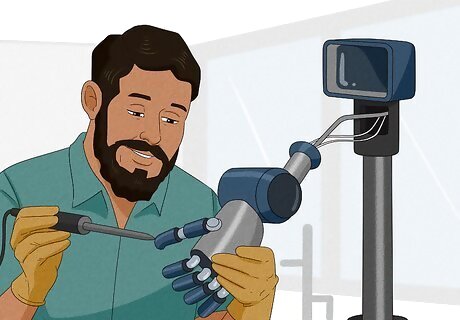
views
- The Logician personality (INTP) uses reason and logical predictions to solve problems, as they’re an Introverted, Intuitive, Thinking, and Prospecting individual.
- When Logicians become overly analytical, they can get consumed by their work and isolate themselves from the world.
- INTPs are introverts and tend to thrive in small social circles with individuals that mentally stimulate them.
Who is a Logician (INTP)?

A Logician is a flexible thinker with an unconventional approach to life. The INTP Myers-Briggs personality type, also known as “The Logician” or “The Thinker,” is an introverted and natural problem solver. These individuals are inventive, imaginative, and independent; however, skepticism and self-doubt often holds them back. INTPs may be reserved, but they love taking on a challenge, especially when it involves a puzzle. Logicians love reading, playing chess, doing puzzles, working with computers, hiking, meditating, and doing arts and crafts. Because of their analytical minds, INTPs make excellent architects, engineers, lawyers, and mathematicians. Famous INTPs include Albert Einstein, Bill Gates, Kristen Stewart, and Isaac Newton. About 3.3% of the US population are INTPs. INTP stands for Introverted, Intuitive, Thinking, and Prospecting.
INTP Strengths

Intelligent Above all else, INTPs are extremely smart individuals. Their analytical and curious natures help them see the causes and effects of the world around them. They naturally gravitate toward activities and subjects that are mentally stimulating. As a result, Logicians are usually skilled in science and math.

Analytical INTPs use logical reasoning to assess the world around them. Whether they’re analyzing research or relationships, they tend to see it objectively. Because of this, they can easily spot patterns, connections, or flaws in everyday life. Theories and abstract ideas are their favorite things.

Open-minded INTPs are driven by passion and curiosity. They love learning new things and have a compassionate heart. Because of this, Logicians are very receptive to new ideas (as long as the ideas are logically supported). They’re adaptable and flexible; ready to take on any challenge that comes their way.

Objective What do Logicians value most? The truth. After all, they’re all about logic and reason. They’re not easily swayed by emotions or opinions but rather keep an objective stance on all matters, following reasonable truth wherever they go.

Creative At their core, INTPs are immensely creative. They have superb imaginations and can come up with original solutions and ideas quickly. Despite their analytical nature, they tend to think outside the box, resulting in outstanding innovations.
INTP Weaknesses

Isolated INTPs are often disconnected from society. Although incredibly smart and analytical, they tend to miss social cues because of their reserved nature. They're easily lost in their own train of thought, and their introverted nature can make social interactions awkward.

Insensitive With logic and objective reasoning as their driving force, Logicians may come across as skeptical or insensitive. They don’t necessarily mean to ignore or push aside someone else’s opinion, but they won’t hesitate to state the facts (especially if someone’s logistically wrong).

Overwhelmed More often than not, INTPs are always looking for the next best thing. While life is one big problem for a Logician to solve, it can often leave them dissatisfied or stressed. Too much analysis can overwhelm them, as they’re easily consumed by work. This overwhelming feeling is often called “analysis paralysis,” as INTPs can become too indecisive and unsatisfied with their logical findings.

Impatient Logicians tend to want to get things done right away. When they have an idea, they want to see it come to fruition immediately. They may be objective, but they can also be irrational if told to wait.

Perfectionistic An INTP’s intellect can get the best of them. Logicians tend to hold themselves to high standards. They want to get things done quickly and efficiently, and they'll blame themselves if something doesn’t go according to plan.
INTPs in Relationships

In romantic relationships, INTPs crave mental stimulation. The best partners for Logicians are those who challenge their intellect. INTPs don’t want just any partner—they want someone who makes them think. They cherish partnerships that allow them to grow and learn. Ultimately, they seek someone who helps them be better. If you’re an INTP, work on expressing your emotions with your partner. We know emotions are fickle, but saying how you feel when you feel it can help you communicate better as a couple. If you’re crushing on an INTP, avoid playing mind games. Logicians are direct and objective individuals; they like hearing the truth flat out. So, tell them how you feel right away to earn their respect (and a possible “yes”). INTPS and INFJs are considered the “golden pair” of Myer-Briggs relationships, as these personalities complement one another’s strengths and weaknesses.

Logicians are naturally shy and need time to recharge. As introverts, INTPs prefer to spend a night in rather than a night out. Because of this, they tend to make friendships slowly and have a harder time opening up to people; however, the friends they do have, are incredibly close to them. They hold their closest friends to their heart and treat them like family. If you’re an INTP, make time in your schedule to branch out of your comfort zone and meet new people. Give yourself plenty of alone time to reset, and then head out! Sign up for a community art class, or take your dog to the park every Saturday. If you’re friends with an INTP, don’t push them to go out when their social battery is drained. The more you respect their space, the more likely they’ll want to hang out with you.

INTPs form lasting relationships based on logic. Above all else, logicians are attracted to mental energy. They gravitate towards other intellectual individuals. INTPs want their friends and romantic partners to be just as smart as they are—what’s a relationship without insightful conversations? If you’re an INTP, pay attention to what others are saying around you. Then, jump into a conversation when you have something new to add to the discussion. If you know an INTP, dump a fun fact every now and then to get their attention. Don’t be afraid to show off your smarts, as that’s sure to put you on their radar.
INTPs at Work

Logicians may struggle to find jobs that suit them. On paper, INTPs seem to have it all together. They’re smart, curious, and adaptable—it should be easy for them to find a job! Well, not exactly. Many INTPs have a difficult time staying in a career. For instance, their unique perspectives and analytical views can often come across as passive or combative. If you’re an INTP, look for jobs that enrich your innovative, creative, and research-loving heart. Try your hand at being an archaeologist, artist, creative writer, or investment banker. If you’re looking to hire an INTP, cultivate a work environment that’s intellectually enriching. Provide an INTP employer with challenging research intense tasks, and ask them to come up with solutions to company problems.
INTPs as Parents

As parents, Logicians value learning. While an INTP may be bewildered by their child’s messy and irrational behavior, they greatly value their role as a parent. They take pride in their ability to teach their child to learn and experience things for the first time. Logicians encourage their children to think independently, solve problems, and follow the beat of their own drum, allowing them to grow and learn at their own pace. Think of it this way: INTP parents most likely have cupboards full of interactive educational games, have PBS Kids playing at all times, and have annual museum passes for them and their kid(s).


















Comments
0 comment